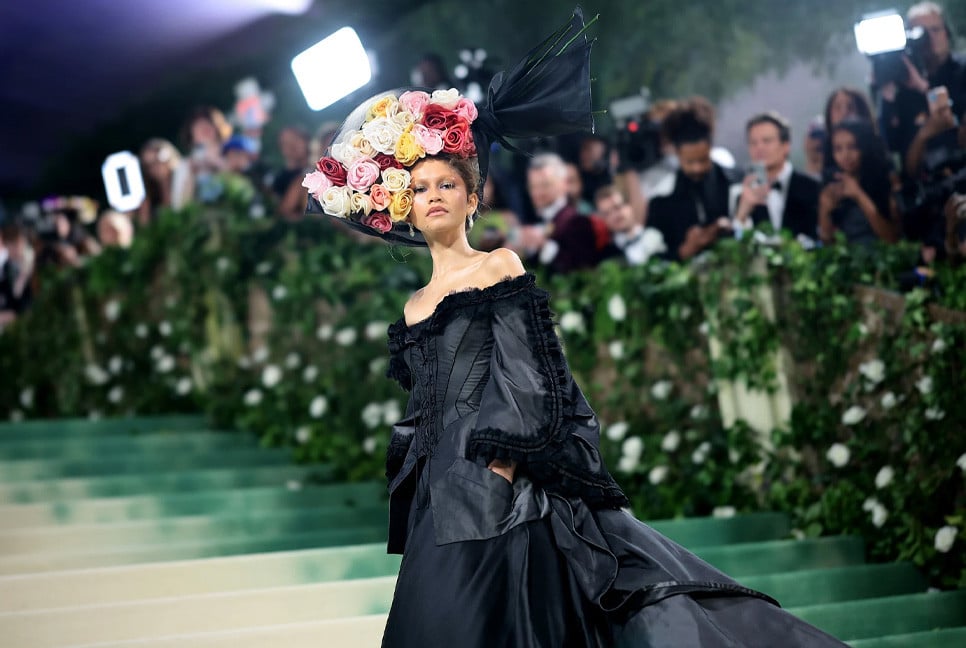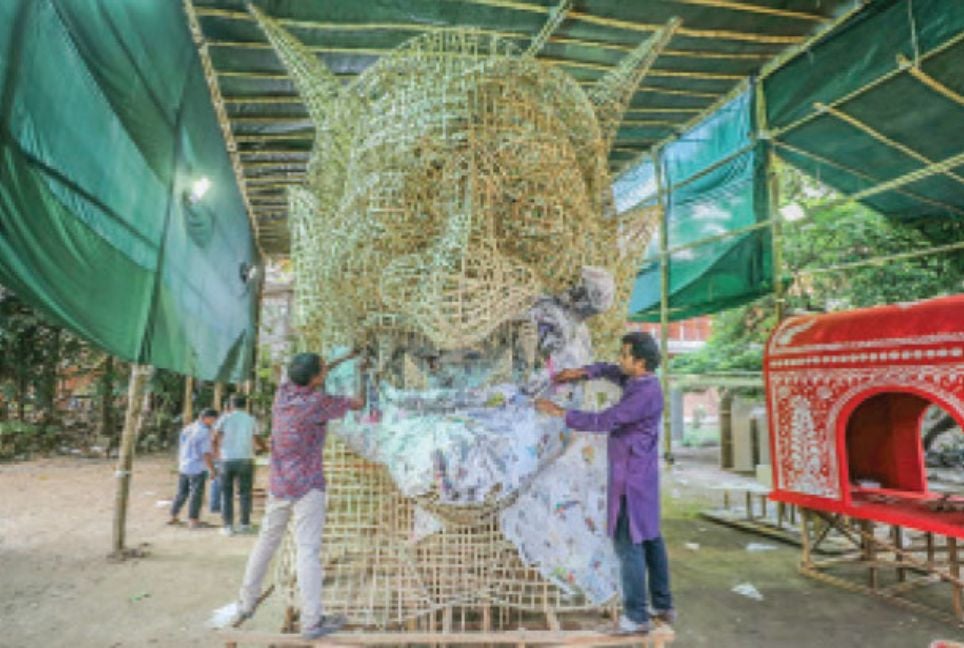Every time a celebrity poses on a red carpet, countless cameras flash, forever immortalizing their outfit, preserving the hundreds or even thousands of hours it has taken to create.
Sunday night’s Golden Globes were no different, with Zendaya channeling old Hollywood glamor in a saffron Louis Vuitton gown, Angelina Jolie wearing a dazzling crystal chain McQueen dress and Tilda Swinton donning a custom embroidered Chanel jacket.
Online, such red carpet outfits have long afterlives as they are shared around social media, dissected by influencers and journalists alike. But the real-life fate of the garments themselves is less well-publicized. What happens to them after their moment of fame — where do they go and when are they seen again?
The afterlives of outfits can take many different forms — some are kept in storage, some are displayed at exhibitions, some wend their way onto the open market and are auctioned, and some are bought by the celebrities wearing them. Occasionally, some don’t even survive the night.
Over the past two decades, the outfits worn by celebrities at red carpet events have garnered more and more attention, and consequently significance, said Lucy Bishop, a specialist in handbags and fashion at auction house Sotheby’s.
She pinpoints the Dior chartreuse embroidered gown designed by John Galliano and worn by Nicole Kidman at the 1997 Oscars as one of the earliest turning points that “changed the trajectory of red-carpet dressing,” signaling the start of fashion houses “very publicly partnering with a celebrity and sort of officially dressing them for the red carpet.”
“Before, it wasn’t such a formal partnership,” she told CNN.
It ushered in an age in which teams of stylists and designers are all involved in creating and realizing a red-carpet look, particularly for the highest profile events like the Met Gala and the Oscars. As such, the incentives for preserving the immense work required to produce these looks are much higher.
“Those days of a gown being packed away and forgotten about for many years and rediscovered are sadly gone,” Bishop added. “Now, often when a gown is worn on the red carpet, there is usually a plan put in place for where that gown will end up.”
Most of the time, fashion houses are responsible for this plan since they often own the red-carpet outfits they designed, though a few celebrities acquire specific gowns for themselves.
Kim Kardashian told Vogue in May that she had every one of her Met Gala outfits “saved” in her wardrobe, except the iconic Marilyn Monroe dress she wore two years ago before returning it to Ripley’s Believe It or Not!, which had loaned it to her for the event. Similarly, Zendaya bought the black taffeta 1996 Givenchy by Galliano gown she wore at last year’s Met Gala, her stylist said in an interview.
Preserving the gowns
The very first thing that happens to a red-carpet outfit after an event is a cleaning process, said Sarah Scaturro, chief conservator at the Cleveland Museum of Art. The person wearing the outfit “might have on body lotions, oils, perfumes, makeup and even if you don’t see that right away … over time, these materials and stains can actually start to oxidize and they will start changing the color of the fabric, and maybe even the texture,” she told CNN.
Usually that process involves dry cleaning, but it can sometimes involve wet cleaning or simply vacuuming and brushing the garment, if everything else is impossible, Scaturro added.
Once garments have been cleaned, they almost always end up in a specialized storage facility — such as a fashion house’s archive or a private one, like that of Julie Ann Clauss, founder of The Wardrobe, an archiving and storage studio.
The outfits remain here for years, meticulously maintained and preserved, only leaving if they are selected for exhibitions or to be worn again — an increasingly common practice with the rise of vintage fashion on the red carpet.
Clauss and her team carefully consider how best to preserve the roughly 100,000 pieces in their safekeeping — from the low light levels and controlled temperature and humidity levels, to the specific way in which the garment is stored.
“It’s really a case-by-case basis about how each particular item is mounted or stored,” she said. “So some things hang, some things are boxed, and some things have to be mounted, meaning they’re on, like a dress form, because these things are designed to be worn. They’re not really designed to hang or to be laying flat.”
Some leave for a time if they are selected for exhibitions, like last year when Britain’s Kensington Palace hosted a “Crown to Couture” exhibition.
It featured several iconic looks, including the Marilyn Monroe-inspired tulle Oscar de la Renta dress worn by Billie Eilish at the 2021 Met Gala, the showstopping “Sun God” outfit worn by Billy Porter as he was carried into the 2019 event on a velvet litter, Rihanna’s 2021 voluminous Balenciaga black coat dress, and the glittering gold Peter Dundas dress Beyoncé wore for the 2017 Grammys.
In this way, these outfits become like pieces of art, their craftsmanship preserved and admired from a distance, no longer really clothes but exhibits and artifacts that will be studied by some future historian.
Getting outfits to these exhibitions is its own daunting task, too. Clauss recalled recently helping a client transport outfits for a tour that were “like these three dimensional, huge things, but fine beading, heavy crystals on really delicate stretch tulle fabric.”
“I was like: ‘Guys we can’t put these in a box…’” she said. “They need custom mounts made so they’re stable flying internationally and then they need to have a crate built around it. You see these crates and they’re tremendous, sometimes they’re like seven feet tall for a dress.”
An unexpected discovery
Before red carpet dressing became so important for the fashion houses from the 1990s onwards, it was more common for a gown to be kept by the person who wore it, who would sometimes give it away or sell it on the open market, said Bishop.
Most famously, Elizabeth Taylor gave away the Dior gown she wore to collect her Oscar and, instead of ending up in the Dior archives, the dress was found packed away in a suitcase belonging to her friend and former employee Anne Sanz. It later fetched $200,000 at an auction, according to Kerry Taylor Auctions.
Even today, gowns are occasionally found on the open market, sometimes by taking unconventional routes.
After the 2019 Golden Globes, Lady Gaga allegedly left her billowing periwinkle gown in her hotel room where it was later picked up by a housekeeper who turned it in to the lost and found at the Beverly Hilton hotel.
The Valentino haute couture gown spent months there before the housekeeper said the hotel “gave it to me as a gift” and offered it up at an auction, though it’s unclear whether the sale ultimately went ahead. (CNN reached out to Nate D. Sanders Auctions, which handled the sale, and Valentino, for comment.)
Then there’s the garments that don’t even survive the night. For her entrance to the Met Gala last year, singer Tyla wore a custom Balmain dress, encased with three shades of sand mixed with micro crystal studs for extra depth, and it proved to be one of the most striking and innovative looks of the night.
But later that evening after the red carpet event, designer Olivier Rousteing cut the long skirt off with scissors, allowing Tyla to walk after she had needed four men to carry her up the museum’s steps. Like the sands of time it represented, the dress had run its course.
Source: CNN
Bd-Pratidin English/ AM


































































